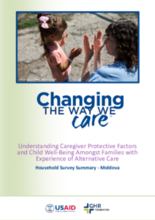A key feature of CTWWC’s theory of change is building evidence on children's care and reform, particularly regarding reintegration from residential care, transitions to family-based care, and preventing separation. Therefore, CTWWC has undertaken surveys with families supported by CTWWC’s demonstration efforts, with the aim of providing insights for policymakers and practitioners on the impacts of interventions to support reintegrating families and those at risk of separation. To this end, the survey addressed the following research questions:
- What aspects of family strengthening support do caregivers think have affected (negatively and positively) their ability to care and provide for their children?
- What proportion of children and caregivers report selected protective factors in their life?
- What proportion of children at risk of separation from their families or who have been reunified or placed in family-based care are experiencing positive well-being?
- How might caregiver protective factors correlate with child well-being?
- How has the perceived well-being of children changed after their engagement with CTWWC?
The survey tool was developed in 2021, combing validated measures (including on disability, parenting skills, protective factors, hunger etc.), with a new measure on child well-being with input from children and young people in Guatemala and Kenya. For Moldova, the tool was adapted to fit the local context by adjusting terminology and phrasing of some questions and responses, and removing questions that were not relevant, such as those about school fees. The survey was translated into Romanian and Russian.
There were three main components to the survey:
- a section for primary caregivers to respond to about themselves and their household covering demographics, protective factors, parenting and economic stability,
- a section for caregivers to respond to about the child in their care who had been reunified or placed in their care from residential care, or a randomly selected child if the family was receiving support to prevent separation covering child’s demographics, disability, care history, health and education, and
- a section for children aged 11 years and older to respond to about their health, education, well-being, and family and community acceptance.
Selection, invitation and informed consent procedures were undertaken in line with approved protocols (Boston College Institutional Review Board). In Moldova, 68 households were identified as eligible to be surveyed, of which 42 (85%) participated in the survey. Data was collected between 18 August - 12 September 2023. Data was provided on 70 children by 42 caregivers. Sixteen children aged 11 and over were identified to participate as respondents themselves, of whom 14 (87%) completed the survey.
Amongst the 42 caregivers, who participated: all but one were female, 69% were aged 30-49 years, 64% were married and 12% had a disability. Just over 50% of caregivers had completed primary school, with another 40% also finishing secondary school. Amongst the 70 children, 46% were female, 50% were aged 6 years or younger but ages ranged all the way from one to 18, 56% had a disability, and 44% were living with their biological mother with another 37% living with a foster carer.

